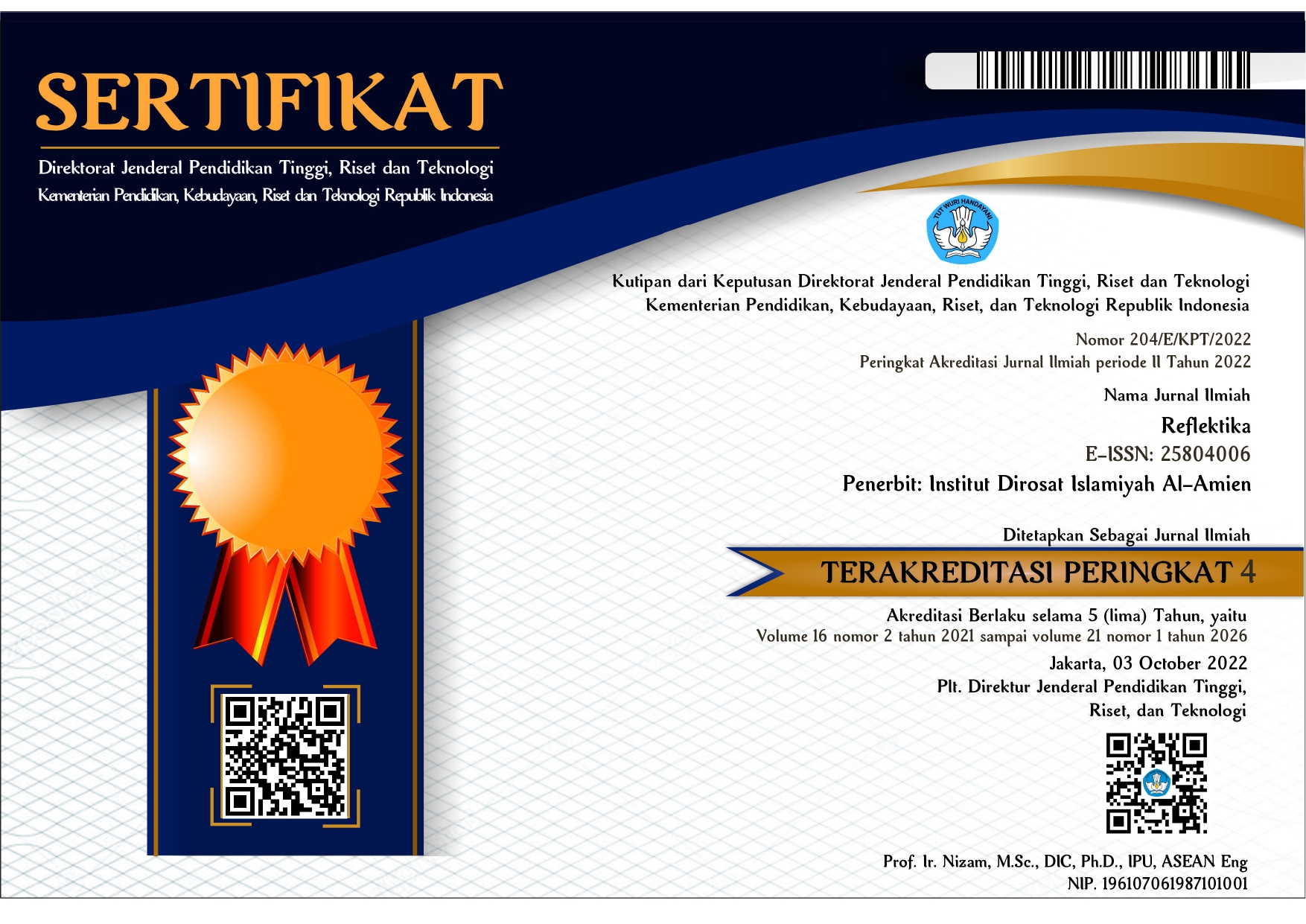NILAI PENDIDIKAN AKHLAKDALAM AL-QUR’ANSURAH AL-ISRA’ AYAT 23-27 DAN RELEVANSINYA DIERA REVOLUSI INDUSTRI 5.0
Abstract
The purpose of this research is to ascertain whether the moral education espoused in Surah Al-Isra' verses 23-27 is relevant in today's society, which is marked by a greater degree of technical progress. The purpose of this research is to examine the many possible precedents for the moral education principles found in the Qur'an. Research is done at libraries, and it may be done in a number of different ways, such as by collecting data, by reading scientific publications that lead to the topic of study, or by obtaining literary data. The value of moral education, as addressed in Al-Isra' verses 23-27, is examined using semiotic analysis, and the results show there may be a relationship between the importance of moral education and the development of the fifth industrial revolution. In particular, verses 23–27 of Surah Al-Isra' stress the following characteristics of moral education as comprising the value as mentioned therein: a) Respect for one's parents (ihsan) and avoiding making false claims about Allah are examples of Allah-honoring morals. b) Humility towards one's parents and regular prayer on their behalf are moral obligations. c) The duty to serve one's parents with integrity and to apologise to them for any wrongdoing on one's part. d) Let's make things simpler for our needy family. e) Adopting a frugal lifestyle and not wasting money or resources, which is important in the post-"4.0" era of industrialization: a) Changes in how individuals usually interact with one another. b) how far apart they keep themselves socially in modern society. c) Changes in conventional social practises. d) Changes in the accepted standards of hospitality in modern culture. e) Results and changes in people's social behaviours
Â
Â
Keywords
References
A‟yun, Qurota. “Materi Pendidikan Akhlak Menurut Syeikh Umar Baradja Dalam Kitab Al-Akhlak Lil-Banaat.†Universitas Islam Negeri Raden Intan Lampung, 2018.
Awaliyah, Tuti, and Nurzaman Nurzaman. “Konsep Pendidikan Akhlak Menurut Sa’id Hawwa.†Jurnal Penelitian Pendidikan Islam 6, no. 1 (2018): 23. https://doi.org/10.36667/jppi.v6i1.152.
Bafadhol, Ibrahim. “Pendidikan Akhlak Dalam Persfektif Islam.†Jurnal Edukasi Islami Jurnal Pendidikan Islam 06, no. 12 (2017): 45–61.
Hablari, Chairudin. Klasifikasi Kandungan Al-Qur’an. Jakarta: Jakarta: Gema insanu pres, 2015.
Ismail, Asmuri. “Nilai-Nilai Pendidikan Akhlak Dalam Kitab Maraqiy Al-‟Ubudiyah Karya Syaikh Muhammad Bin Umar An-Nawawi Al-Jawi.†Institut Agama Islam Negeri Surakarta, 2017.
Kasali, Renald. Disruption. Jakarta: Jakarta: Gramedia Pustaka Utama, 2017.
Kusumastuti, Deasy. “Nila-Nilai Akhlak Yang Terkandung Dalam Qur’an Al-Isra.†Universitas Sebelas Maret, 2014.
Lasmawan, Wayan. “Era Disrupsi Dan Implikasinya Bagi Reposisi Makna Dan Praktek Pendidikan.†Jurnal Media Komunikasi Pendidikan Pancasila Dan Kewarganegaraan 1, no. 1 (2019): 54–65.
Maslikhah. Insklopedia Pendidikan. Salatiga: Salatiga: Stain Salatiga Press, 2015.
Mestika, Zed. Metode Penelitian Kepustakaan. Cet. ke-1. Jakarta: Jakarta: Yayasan Obor Indonesia, 2014.
Nilasari, Suyeti. “Pendidikan Di Era Revolusi Industri 5.0 Terhadap Disiplin Kerja Guru.†Jurnal Online Universitas PGRI Palembang, 2019.
Puspita, Yenny, Yessi Fitriani, Sri Astuti, and Sri Novianti. “Selamat Tinggal Revolusi Industri 4.0, Selamat Datang Revolusi Indusrti 5.0.†Jurnal Online Universitas PGRI Palembang, 2019.
Sangadji, Etta Mamang, and Sopiah. Metodologi Penelitian Pendekatan Praktis Dalam Penelitian. Yogyakarta: Yogyakarta: Cv Andi Offset, 2015.
Sari, Milya, and Asmendri. “Penelitian Kepustakaan (Library Research) Dalam Penelitian Pendidikan IPA.†Jurnal Penelitian Bidang IPA Dan Pendidikan IPA 6, no. 1 (2019): 13.
Yuliantini, Yanti Dwi; Adita Widara Putra. “Semiotika Dalam Novel Rembulan Tenggelam Di Wajahmu Karya Tere Liye.†Jurnal Literasi 1, no. 2 (2017): 68.
DOI: 10.28944/reflektika.v14i2.1229
Refbacks
- There are currently no refbacks.


.png)

